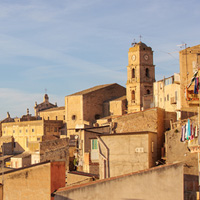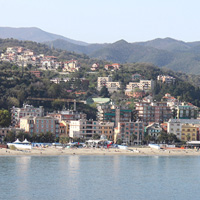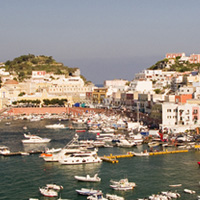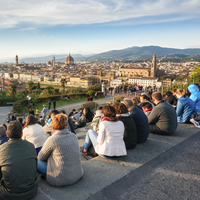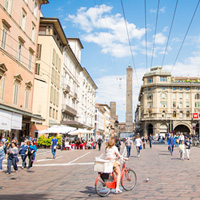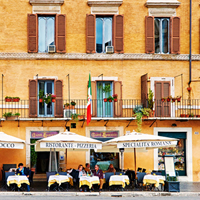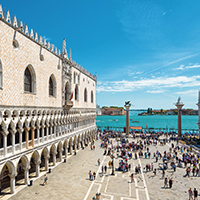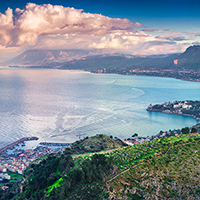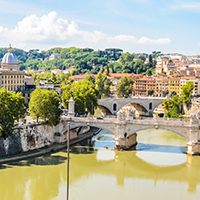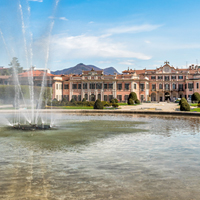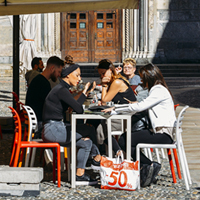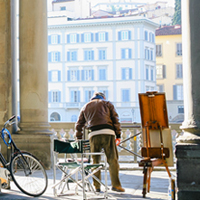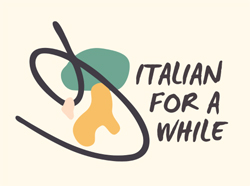Italy
Coastal BeachesItaly has long been a dream destination for expats seeking a rich cultural experience, excellent quality of life, career opportunities in Europe, or a great place to retire. From the historic and contemporary streets of Rome, to the artistic hubs of Florence, to the to the innovation and style of Milan, the options are as varied as they are inspiring. Throw in the stunning coastlines of Cinque Terre and the Amalfi Coast, the gorgeous countryside of Tuscany, Piedmont and Umbria, and Italy clearly offers a lifestyle that blends tradition with modern convenience.
Expats, including digital nomads, entrepreneurs, and professionals, are drawn to its growing remote work infrastructure, favorable visa options, and world-class cuisine. With its welcoming communities, one of the largest economies in Europe, and breathtaking landscapes, Italy remains a top choice for those looking to live and work abroad.
Italy’s diverse regions offer expats a rich variety of lifestyles, from the economic and fashion hub of Milan in the north to the sun-soaked shores of Puglia in the south. The Italian countryside, with its rolling vineyards and olive groves, provides a slower pace of life and world-renowned wines and olive oils. The coastline of Liguria offers a balance between seaside living and easy access to Italy’s economic centers. The Italian Alps and Dolomites provide year-round outdoor opportunities, from skiing to hiking, while the central Apennines offer a more rugged, off-the-beaten-path experience. Meanwhile, Italian cuisine remains an essential part of daily life, with each region offering its own specialties—ensuring that no matter where expats settle, they’ll be immersed in a deep culinary tradition.
Italy offers both opportunities and challenges for expats looking to work or start a business. As one of the Eurozone’s largest economies, Italy has key industries that include fashion, automotive, manufacturing, and tourism, with major hubs in Milan, Turin, and Bologna. Work visas can be difficult to secure, often requiring employer sponsorship, while self-employment and elective residence visas have strict financial criteria. Despite bureaucratic hurdles and high taxes, there are absolutely emerging opportunities in digital innovation, green energy, and an ever-increasing interest in accommodating those interested in a remote-work lifestyle.
However, while Italy has much to offer expats, such as a relatively low outside major cities, and a welcoming expat community, it also comes with challenges such as bureaucracy, high unemployment in some regions, and a slower pace of life that can take significant adjustment for some people.
For those willing to navigate these realities - and many expats are thrilled to embrace that slower pace of life - Italy offers a deeply rewarding experience that blends old-world charm with modern opportunities and convenience.
 Italian For A While
Italian For A WhileConnect
Become ‘Italian for a While’ with IFA! Learn in Italy on a 1-week to 12-month program - open to students, young adults, graduates, digital nomads, professionals, groups, faculty-led programs, and more. Take courses at an accredited school while immersing yourself in the language, life, and culture among your international peers. Submit an inquiry with IFA to learn more.
Click connect to have our partner contact you via e-mail and/or phone.
 Italian For A While
Italian For A WhileBecome ‘Italian for a While’ with IFA! Learn in Italy on a 1-week to 12-month program - open to students, young adults, graduates, digital nomads, professionals, groups, faculty-led programs, and more. Take courses at an accredited school while immersing yourself in the language, life, and culture among your international peers. Submit an inquiry with IFA to learn more.
Connect
Click connect to have our partner contact you via e-mail and/or phone.
Living in Italy
Best Places to Live in Italy
Visa & Residency
Obtaining a residency in Italy involves several steps and the process can vary depending on the type of visa you are applying for. The most common types of visas for expats include the Elective Residence Visa and the Work Visa. The Elective Residence Visa is designed for individuals who can prove they have a high, steady income from sources outside of Italy and do not need to work in the country. Applicants must show they have sufficient funds to support themselves, a place to live, and comprehensive health insurance. This visa is valid for one year and can be renewed. The Work Visa is for those who have secured a job in Italy before entering the country. The employer must apply for a work permit on behalf of the employee, which is subject to quotas. Once the work permit is granted, the employee can apply for the visa. This process can be quite competitive and time-consuming due to the quota system. Other visas include the Student Visa and Family Reunification Visa. The process generally involves gathering the required documentation, such as a valid passport, proof of financial means, accommodation, and health insurance, and submitting an application to the Italian consulate or embassy in your home country. An appointment is usually required, and you may need to attend an interview. The difficulty of the process can vary; it is often described as average, but it can be challenging due to the bureaucracy and strict requirements. It is advisable to start the application process well in advance of your intended move date and to seek assistance from professionals if necessary. Once in Italy, you will need to apply for a residence permit (permesso di soggiorno) within eight days of arrival to stay legally. This additional step involves going to the local post office or police station (Questura) to submit the necessary paperwork. Overall, while the process can be bureaucratic and requires careful preparation, it is manageable with the right planning and support.
Healthcare in Italy
The healthcare system in Italy is a regionally based national health service known as Servizio Sanitario Nazionale (SSN) that provides universal coverage, largely free of charge at the point of service. Public healthcare is funded by a combination of national and regional taxes. Private healthcare is also available and is often used as a complement to public services, offering faster access to treatment and more luxurious facilities. The quality of healthcare in Italy is generally high, with a good ratio of doctors to patients and modern facilities, although there can be regional disparities with the north typically better served than the south. Expats and digital nomads who are residents in Italy and make social security contributions can access public healthcare. Those with a European health insurance Card (EHIC) can use it during temporary visits. Non-EU nationals may need private insurance to cover their healthcare needs until they are registered with the SSN.
Cost of Living
The cost of living in Italy is considered high, especially in major cities like Rome, Milan, and Florence. Housing, utilities, and transportation can be particularly expensive, although this is often offset by the quality of life and public services available.
Weather
Italy experiences a varied climate. The north has a continental climate with cold winters and hot summers, while the central regions enjoy a milder temperate climate. The south and coastal areas typically have a Mediterranean climate with hot, dry summers and mild, wet winters.
Educational System in Italy
The educational system in Italy is known for its structure that emphasizes both academic and vocational training. Education is compulsory from the age of 6 to 16, covering primary and lower secondary education. The system is divided into five main stages: Scuola dell'infanzia (pre-school), Scuola primaria (primary school), Scuola secondaria di primo grado (lower secondary school), Scuola secondaria di secondo grado (upper secondary school), and higher education. Primary school lasts five years, and upon completion, students receive a diploma di licenza. Lower secondary school, also known as middle school, lasts three years, culminating in the diploma di licenza media. Upper secondary school offers various types of programs, including classical, scientific, and vocational, lasting five years and leading to the Maturità, which is required for university admission. The Italian education system is known for its historic and well-established institutions, with a strong emphasis on the humanities and sciences. The quality of education is generally high, with a focus on critical thinking and creativity. Children typically start school at age 6 and graduate at age 19 if they follow the traditional path without repeating any years.
Universities in Italy
The university system in Italy is one of the oldest in the world, with its roots stretching back to the University of Bologna founded in 1088. Italian universities are divided into public and private institutions, with the majority being public. The academic year is usually divided into two semesters, and the language of instruction is predominantly Italian, although there are programs offered in English, especially at the postgraduate level. Undergraduate degrees (Laurea Triennale) typically take three years to complete, while a master's degree (Laurea Magistrale) requires an additional two years. There is also the Laurea Magistrale a Ciclo Unico for certain professions like law, pharmacy, and architecture, which is a single-cycle five or six-year program. Doctoral programs (Dottorato di Ricerca) usually last three to four years. The university system in Italy is part of the Bologna Process, aiming to ensure comparability in the standards and quality of higher-education qualifications across Europe. Foreign students considering attending university in Italy should be aware of the entrance exams and language proficiency requirements. The cost of education is relatively low compared to other Western European and North American countries, and there are scholarships and financial aid options available for international students.
Copyright 1997-2025 Burlingame Interactive, Inc.

